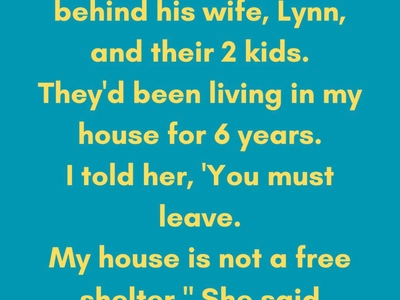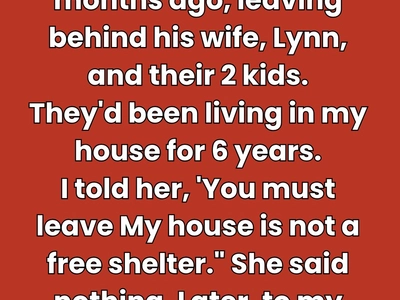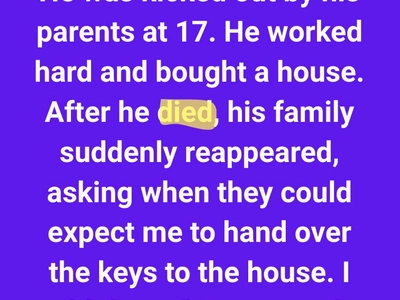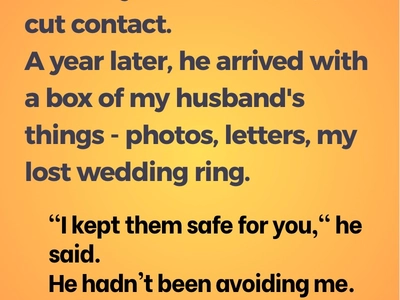How Loss Showed Me the True Meaning of Family and Home
For six years, Lynn and her two children had lived with me. Our home used to be full of life — laughter echoing from every room, toys scattered across the living room, the smell of dinner filling the air. When my son was still alive, their presence never felt like an intrusion. In fact, it felt right. We were one big, noisy, happy family. He loved his children fiercely, and Lynn brought warmth and balance to the house. I often thought how lucky we all were to live under one roof, sharing meals, stories, and quiet evenings. But when my son passed away, that warmth disappeared overnight.
The house that had once been filled with laughter became unbearably silent. Every sound — the creak of the stairs, the hum of the refrigerator, the soft footsteps of the children — reminded me of what I had lost. My son’s voice still echoed in my mind. Sometimes, I’d think I heard his laugh coming from the garden, only to realize it was just the wind rustling the leaves. The grief came in waves. Some days, I felt almost normal; on others, I couldn’t even bring myself to get out of bed.
Lynn tried to keep things together. She cooked, took care of the children, and tried to fill the house with small joys. But everything she did — every smile, every attempt to keep life moving — felt like a painful reminder that he was gone. I couldn’t look at her without seeing my son’s face, without thinking of all the dreams they had shared and the life they were supposed to have together.
One afternoon, when the weight of grief had grown too heavy, I snapped. I don’t even remember exactly what triggered it. Maybe it was the sound of the kids laughing in the garden, or maybe it was just another quiet moment that reminded me of all the noise that was missing. I told Lynn she had to leave. My voice was sharp, almost cold. I said I needed space, that the memories were too much, that I couldn’t heal with them around.
Lynn didn’t argue. She just stood there, pale and still, holding one of the children’s jackets in her hands. For a moment, I thought she might cry or plead with me to reconsider. But she didn’t. Instead, she nodded quietly, as if she had expected this. That calmness cut deeper than anger ever could.
That evening, she packed up their things. I watched from the hallway as she folded tiny shirts and tucked away toys. The children didn’t understand. “Are we going on a trip, Grandma?” one of them asked. I couldn’t answer. I just turned away. When they finally walked out the front door, the silence that followed was unbearable. I had thought the house felt empty before — but now it was hollow.
For days, I tried to convince myself I had done the right thing. I told myself it was better for everyone, that Lynn needed a fresh start, that I needed space to heal. But deep down, I knew it was a lie. I missed the sound of the children’s laughter. I missed Lynn’s calm voice, her steady presence in the kitchen, her kindness even when I was cold to her. I had pushed away the only family I had left.
Then, a few days later, I found the letter.
It was tucked inside a photo album that my son had given me years ago. I had opened it, hoping to find comfort in old memories, and there it was — an envelope with my name written in his handwriting. My hands trembled as I opened it.
“Mom,” the letter began. “If anything ever happens to me, I want Lynn and the kids to stay with you. I want them surrounded by love and familiarity, not loneliness. You’ll need them as much as they’ll need you. Take care of each other. That’s how I’ll live on.”
I read those lines over and over until the words blurred through my tears. My son had trusted me with his greatest treasure — his family — and I had turned them away. The guilt hit me like a storm. I sat there all night, the letter clutched in my hands, replaying every cruel word I had said, every moment I had let my grief speak instead of my heart.
By dawn, I knew what I had to do.
I drove to the small apartment where I knew Lynn was staying. My heart pounded as I climbed the stairs. When she opened the door, she looked surprised to see me. Her eyes were tired, but she still carried that quiet strength that had always amazed me.
“I found a letter,” I said, my voice trembling. “From him.”
She waited silently as I told her what he had written. The words spilled out in broken sentences. I told her how sorry I was, how I had let my pain blind me to what mattered. I told her that she and the children still belonged in the house — not because of obligation or guilt, but because they were family.
For a long moment, Lynn didn’t speak. Then her eyes filled with tears. She nodded, and I saw the weight she’d been carrying finally lift, just a little.
When she and the children came home that afternoon, it felt like the sun had returned after a long, cold winter. The kids ran through the house, their laughter echoing in the halls, filling every empty corner. The smell of dinner filled the kitchen again, and for the first time in months, I felt something close to peace.
That night, after the children had gone to bed, Lynn and I sat in the living room, cups of tea warming our hands. We didn’t talk much. There were too many words and not enough at the same time. But the silence wasn’t heavy anymore. It was gentle, comforting, shared.
I thought about my son — his smile, his kindness, the way he had loved his family. I realized that keeping Lynn and the children close wasn’t just honoring his wish. It was healing us all. In their laughter, I could hear him again. In their presence, I could feel his love living on.
Grief had made me push people away. It had convinced me that pain was something I had to face alone. But love doesn’t disappear when someone dies. It changes form. It moves through the people they loved, the memories they left behind, the connections that keep growing even after they’re gone.
Now, when I walk through the house, I still see traces of him everywhere — in the photo on the wall, in the way his daughter laughs, in the way Lynn hums the same tune he used to. The ache never truly goes away, but it’s no longer an open wound. It’s part of who I am, softened by time, surrounded by love.
Sometimes, late at night, I still take out that letter. The paper is creased now, the ink slightly smudged from tears. I read it slowly, letting every word sink in. Each time, I feel his presence — not as a ghost or a memory, but as a quiet warmth that fills the room.
I used to think the hardest part of losing someone was the emptiness they left behind. But now I know the real challenge is learning how to live with that emptiness — how to let it transform into something softer, something that reminds you of love instead of loss.
We’ve rebuilt something beautiful in this house. It’s not the same as before; it never could be. But it’s real, and it’s ours. The kids fill the garden with laughter again. Lynn tends to the flowers he once planted, and I find myself smiling when I see new blossoms appear. Life goes on, quietly, tenderly, even when you think it can’t.
Sometimes I catch Lynn watching the children with that faraway look — the one that says she still misses him every second of every day. When our eyes meet, we don’t need to say anything. We both know that pain, and we both know that love.
There are still moments when grief sneaks up on me — when I hear a song he used to play, or when I pass by his old jacket hanging in the closet. But now, instead of breaking down, I find comfort in those moments. They remind me that he was real, that his love is still here in everything he left behind.
Our home has changed again. It’s no longer haunted by silence or regret. It’s alive with the sounds of living — children’s laughter, Lynn’s gentle voice, the clatter of dishes, the hum of life returning. I know now that pushing them away didn’t protect me from pain; it only deepened it. Bringing them back brought me healing.
I don’t know what the future holds, but I know this: my son’s spirit lives on through the love that connects us. Every smile, every shared meal, every bedtime story is a thread that ties us together — and ties us to him.
When I think about that dark day when I told Lynn to leave, I still feel ashamed. But I also know it was part of the journey — a painful lesson that taught me what truly matters. Love doesn’t fade with death. It doesn’t vanish in grief. It endures, stubbornly, quietly, like a light that refuses to go out.
Now, when I stand by the window and watch the children play, I whisper a silent promise to my son: I’ll take care of them. I’ll keep the laughter alive. I’ll make sure our home is always filled with warmth, just like you wanted.
And as the sun sets, painting the sky in colors he once loved, I feel a calm I haven’t felt in years. He’s gone, but not lost. His love lives here — in the walls, in the hearts, in the life we’ve rebuilt together.






